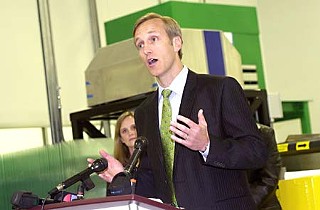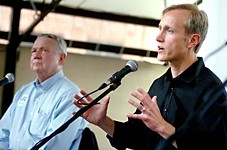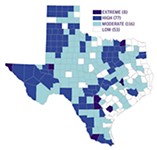An Ethical Pecan to Crack
Former City Council Member Brewster McCracken hits a Pecan Street Project roadblock
By Katherine Gregor, Fri., Aug. 14, 2009
As a City Council member, Brewster McCracken championed and helped organize the Pecan Street Project. But an unanticipated conflict with city ethics rules suddenly blocked him last week from taking his expected new job as PSP's executive director. At issue: Does administering a green-energy research and development consortium qualify as lobbying or "selling a service" when the relevant nonprofit is organized to partner with the city (and Austin Energy) on advancing mutual goals?
PSP board member Jim Marston expressed confidence that the issues can be sorted out such that McCracken can still serve as PSP's director: "He's way ahead on the learning curve. We'd like to keep his knowledge, his expertise, and his history, without violating either the letter or the spirit of the ordinances."
City Integrity Officer John Steiner explained that while McCracken is free to take a paid position with the new nonprofit-to-be, the restrictions on him seem likely to hinder the project. "It would greatly complicate the ability of the city to deal with the organization and provide funding for the organization," said Steiner.
According to city code (Section 2-7-67), a departing council member (or any executive-level city staffer or official) is barred for one year from appearing formally or informally before the city as a paid representative for any other organization, on "a case, project or matter over which the person exercised discretionary authority." The intent of the required "cooling-off period" is to prevent ethics conflicts, Steiner explained. If an official had power over a matter, he or she can't then immediately get paid to advance it before the city of Austin or any other agency. Were McCracken to assist PSP only in an unpaid capacity – such as volunteer board member – Steiner said there would be no problem.
Another city code provision (Section 2-7-62M) specifically bars for two years a departing council member or mayor from contracting with the city (or even proposing such a thing) "for the sale to the City of any goods or services other than real estate." Citing that section, the city legal department has indicated that PSP could not receive any city funding for two years if the funds flow to or through McCracken. Steiner believes the no-contracting rule remains an "interpretive issue, as to whether that would apply to an organization for which someone works." The rule has been in place since 1987 (what conflict arose then, we wonder?), but Steiner was not aware of its ever having been applied to salaried work for a nonprofit organization working with the city – only to paid lobbying or individual contracts. City legal issued a ruling on McCracken's involvement at the request of Mayor Pro Tem Mike Martinez.
McCracken referred questions to Marston, a lawyer who served on the Texas Ethics Commission before heading the state office of the Environmental Defense Fund. When city legal issued its decision right before council's vote to authorize PSP last week, said Marston, "We were surprised, because the goal was never to find a job using city money for Brewster; the goal was for Pecan Street to find outside money, to help the city and create an economic development opportunity for the city." He said he had no indication that any city official was hostile to McCracken in the role. After the four noncity PSP board members conferred, they decided to work on keeping McCracken as director. (Last Thursday, Council Member Randi Shade and AE General Manager Roger Duncan were also appointed by council to the PSP board.)
On the first issue, of representing PSP in influencing the city, Marston thought McCracken's role could be clearly defined to avert problems. "We need to get some clear decisions from city legal" as to exactly what McCracken could or could not do, he said, "and then to stay away from any areas that might be gray. Brewster has told me expressly he doesn't want to ask for any special favors."
On the city contracting issue, Marston said, "I'm confident the money side doesn't need to present a problem." He was committed to simply accepting no city funds. While seed money from Austin Energy had once been discussed, that has been obtained elsewhere. Marston explained that in fact, money would flow in the other direction: PSP will find and provide outside funding and resources for the pilot projects to help achieve city goals without taxpayer dollars. Shade said that after Monday's upbeat PSP board meeting, she saw a constraint on city funding as a positive because it makes the project more independent and inspires other partners to step up. The Pecan Street Project will use Austin Energy's grid to test pilot projects, which are trying to solve the problems of distributing energy from many small sources (such as solar rooftop panels). PSP's initial research report and recommendations are expected by the end of September.
"It will take us a week or two to figure this out, I think," said Marston. "It's a big deal to Brewster, and to me, that this not be an issue at all."
Got something to say on the subject? Send a letter to the editor.










